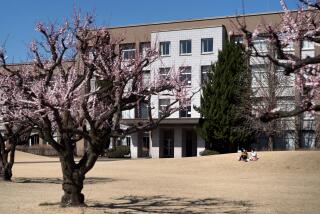JAPAN WATCH : Book Bungle
- Share via
Understanding the subtle nuances and shifts in Japanese politics, industry and society is difficult in the best of times. Now with U.S.-Japan relations a bit edgy, keeping abreast of a changing Japan is more crucial than ever. Japanese-language books and periodicals provide valuable insight into Japan. Yet a U.S. commission chooses now, of all times, to eliminate a book-buying program for Japanese libraries at major American universities.
For more than a decade, the Japan-United States Friendship Commission has spent millions of dollars a year to buy Japanese books and periodicals for 13 top American universities. They include UC Berkeley, UCLA, UC San Diego and Stanford. Congress established the Friendship Commission in 1975 to oversee a $36-million trust fund established when the United States returned Okinawa to Japan. The money is used to promote better understanding between Japan and America. The commission, facing financial pressures, is sacrificing the entire book program in order to fund “policy-oriented research” on Japan and to establish a data base of existing Japanese language libraries in the United States.
“One of the great asymmetries between Japan and the United States is how much they know about us and how little we know about them,” lamented UC San Diego Prof. Chalmers Johnson. Fortunately the commission has not categorically ruled out future support for book buying. The book program is crucial to the U.S. window of understanding on Japan, and its funding must be restored as soon as possible.
More to Read
Sign up for our Book Club newsletter
Get the latest news, events and more from the Los Angeles Times Book Club, and help us get L.A. reading and talking.
You may occasionally receive promotional content from the Los Angeles Times.






